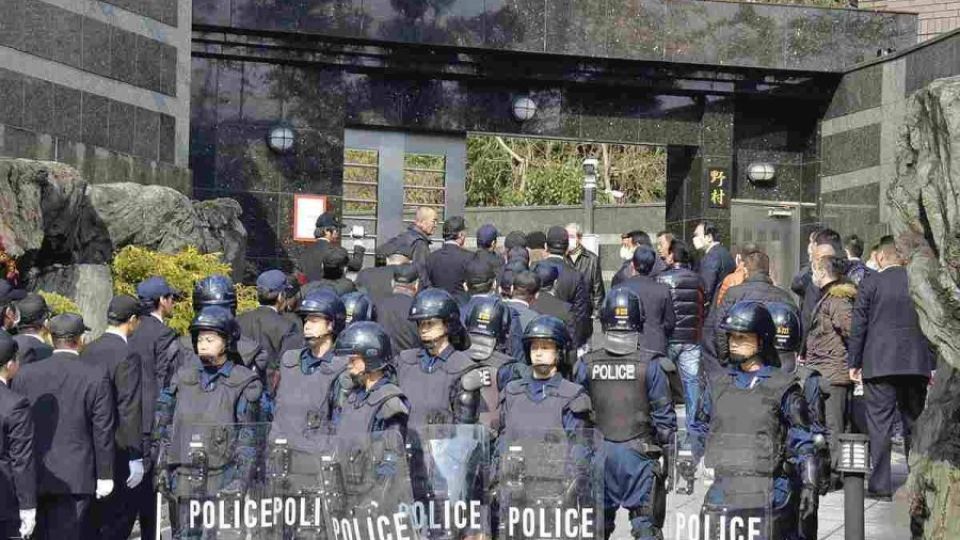(ANN/JAPAN NEWS) – Around 400 yakuza crime syndicate offices were shut down across Japan between 2014 and 2023, according to a report by the National Police Agency (NPA).
This marks a decade since the Fukuoka prefectural police launched a major operation to arrest Kudo-kai chief Satoru Nomura on suspicion of homicide, aiming to dismantle the only crime syndicate designated as “especially dangerous” by the national government. The operation, dubbed “The Summit Operation,” also led to the arrest of the syndicate’s second-in-command, Fumio Tanoue. The Kudo-kai is headquartered in Kitakyushu, Fukuoka Prefecture.
The nationwide movement to eliminate yakuza organizations gained significant momentum following the arrests, supported by public organizations actively working to shut down crime syndicate offices. “Our neighborhood is now safer, and even a national restaurant chain has opened nearby,” said Tomoshi Okuda, 61, who leads Hoboku, a nonprofit organization planning to construct a welfare complex on the former site of the Kudo-kai headquarters.

Located just two kilometers from JR Kokura Station, Kudo Kaikan was once a feared symbol of yakuza activity, regularly visited by Kudo-kai members and their distinctive black cars. However, since the summit operation, use of the office was restricted, and it was eventually sold to a private company in 2019. The profits from the sale were allocated to civilian victims of Kudo-kai-related violence. Hoboku purchased the site in 2020 with plans to build a three-story complex, including a relief center and a community hall.
The Kitakyushu city government played a key role in the sale of the property, with former Deputy Mayor Kazuhide Umemoto stating, “By being involved as a government entity, we fostered public trust and found a buyer.” Okuda hopes to change the city’s reputation from a “dangerous city” to a desirable place to live.
The NPA has not revealed the total number of crime syndicate offices nationwide. However, 407 offices were closed between 2014, when the summit operation began, and 2023, thanks to pressure from residents and public organisations.
In 2014, 41 yakuza offices were closed, followed by 62 in 2016. The number of closures gradually decreased after 2020. Tokyo led with 68 closures, followed by Fukuoka with 63, Hyogo with 35, Osaka with 29, and Aichi and Hokkaido, each with 23.
The Fukuoka police reported the demolition of 49 syndicate offices over the past decade, including 28 from the Kudo-kai and others from groups like the Dojin-kai and Namikawa-kai. Fukuoka police have shared their methods with other law enforcement agencies across Japan, contributing to the growing success of syndicate office closures.
In some cases, public organisations have filed lawsuits on behalf of local residents, seeking to prevent yakuza groups from using their offices, thereby shielding communities from potential retaliation. In October 2020, the Fukuoka Center for Removal of Criminal Organizations filed a successful injunction against the Namikawa-kai, resulting in the demolition of their office in July 2021. Similarly, a Higashiosaka-based affiliate of the Yamaguchi-gumi crime group was forced to close after legal action, with the city purchasing the site in 2022.
Local governments have also taken the initiative. In December 2022, Fukutsu City in Fukuoka Prefecture secured a provisional injunction to shut down a Kobe Yamaguchi-gumi office, marking another victory in the fight against organized crime.
In Shizuoka Prefecture, a Yamaguchi-gumi affiliate’s office was shut down in 2019 after joint efforts by the police, local bar association, and criminal organization removal center.
“Public involvement helps residents feel safer in speaking out,” said Eiichiro Mizuno, 82, a leader in the fight against yakuza presence in Hamamatsu, Shizuoka Prefecture. Kiyoshi Hikita of the Japan Federation of Bar Associations added, “The success against the Kudo-kai, a notoriously dangerous syndicate, emboldened locals to take action.”
Hikita concluded, “We must continue our efforts to eliminate yakuza organisations and their offices, adapting our strategies as needed.”



